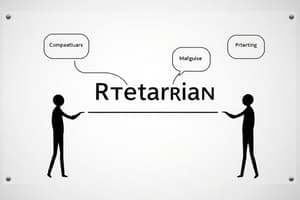Podcast
Questions and Answers
Why is it important to determine the rhetorical situation for a piece of discourse?
Why is it important to determine the rhetorical situation for a piece of discourse?
To consider whether it works within that context.
Which of the following questions can you ask to begin analyzing rhetoric? (Select all that apply)
Which of the following questions can you ask to begin analyzing rhetoric? (Select all that apply)
- Is the rhetoric meant to entertain?
- Does the rhetor give enough information to make an informed decision? (correct)
- Does the rhetoric address the problem it claims to address? (correct)
- Is the rhetoric targeted at an audience who has the power to make change? (correct)
What does rhetorical analysis ask about discourse?
What does rhetorical analysis ask about discourse?
How discourse functions in the setting in which it is found.
As you begin to analyze rhetoric, you might encounter different types of rhetoric such as a ______.
As you begin to analyze rhetoric, you might encounter different types of rhetoric such as a ______.
Rhetorical analysis does not help answer questions about discourse.
Rhetorical analysis does not help answer questions about discourse.
How is rhetorical analysis related to college reading and learning?
How is rhetorical analysis related to college reading and learning?
Provide an example of a campaign that faced criticism due to its messaging.
Provide an example of a campaign that faced criticism due to its messaging.
What influence do individuals who understand rhetorical analysis and act to make change have?
What influence do individuals who understand rhetorical analysis and act to make change have?
What do we tend to notice about our professors?
What do we tend to notice about our professors?
We only make quick analyses of those we are close to.
We only make quick analyses of those we are close to.
What does 'rhetoric' refer to?
What does 'rhetoric' refer to?
Why is learning rhetorical analysis important?
Why is learning rhetorical analysis important?
Emotional appeals (pathos) are often used in which mediums?
Emotional appeals (pathos) are often used in which mediums?
What three parts are involved in understanding the context of a rhetorical moment?
What three parts are involved in understanding the context of a rhetorical moment?
Logos refers to the emotional aspects of persuasion.
Logos refers to the emotional aspects of persuasion.
Match the following rhetorical appeals with their definitions:
Match the following rhetorical appeals with their definitions:
What is exigence?
What is exigence?
How can understanding the audience influence rhetoric?
How can understanding the audience influence rhetoric?
What do constraints in rhetoric refer to?
What do constraints in rhetoric refer to?
Flashcards are hidden until you start studying
Study Notes
Rhetorical Analysis Overview
- Rhetorical analysis involves examining how language and imagery persuade audiences.
- Understanding rhetoric is crucial for becoming informed consumers and evaluating the ethics of messages.
Media and Rhetoric
- Media constantly prompts us to act, buy, or believe by employing rhetorical strategies.
- Individuals are often unaware of how media rhetoric influences their self-perception and decision-making.
Elements of Rhetorical Context
- Rhetorical messages occur in specific situations, involving elements such as exigence, audience, and constraints.
- Exigence is the urgent circumstance prompting a rhetorical response, while audience refers to the intended recipients of the message.
- Constraints include factors that limit or influence the rhetorical choices available to the rhetor.
Rhetorical Appeals
- Aristotle identified three key appeals: logos (logic), pathos (emotion), and ethos (credibility).
- Logos involves presenting factual information and logical arguments to persuade through reason.
- Pathos uses emotional triggers, such as personal stories or vivid imagery, to connect with the audience emotionally.
- Ethos establishes the credibility of the rhetor, influencing how the audience perceives the message’s legitimacy.
Analyzing Rhetorical Messages
- To understand the context of rhetoric, consider what the message responds to (exigence), who it addresses (audience), and what limitations exist (constraints).
- An effective rhetorical analysis looks at how well a piece fits its context and addresses the identified issues.
Importance of Audience
- Understanding the audience is vital for choosing appropriate language, formality, and argument structure.
- A rhetor's decisions are heavily influenced by their knowledge of the audience’s beliefs, values, and demographics.
Evaluating Rhetorical Effectiveness
- Analyze whether the rhetoric effectively addresses the problem it claims to solve and if the intended audience has the power to enact change.
- Assess the appropriateness of rhetorical appeals used and consider any potential for manipulation.
Drawing Conclusions
- A successful rhetorical piece will resonate with its context, address audience needs, and present a compelling argument.
- Engage in self-reflection during analysis by questioning the impacts of the rhetoric and potential ethical dilemmas it raises.
Techniques for Analysis
- Use questioning strategies to guide analysis, such as how well the rhetoric fulfills its promises or the implications of accepting its claims.
- Consider other interpretations of the rhetoric and the assumptions made within the argument to fully grasp its persuasive mechanisms.### Understanding Rhetoric in College
- Various types of rhetoric may be encountered in academia, including political cartoons, scholarly articles, and speeches.
- Formats such as YouTube videos and PowerPoint presentations also contribute to rhetorical analysis in the classroom.
Importance of Rhetorical Analysis
- Rhetorical analysis is crucial for comprehending the intent behind texts and media.
- Understanding a scholar's thesis in journal articles is essential for effective research and writing.
- Being able to analyze persuasive techniques in videos enhances the educational experience.
Case Study: Campbell's Soup Campaign
- In 2000, Campbell's Soup launched a campaign highlighting low-calorie soups, featuring pre-pubescent girls focused on body image.
- The organization Dads and Daughters criticized the ad for promoting negative body images and urged the company to withdraw it.
Impact of Rhetorical Awareness
- Individuals who grasp rhetorical analysis can drive positive social change.
- Understanding rhetoric equips people to challenge harmful advertising and influence public perception.
Studying That Suits You
Use AI to generate personalized quizzes and flashcards to suit your learning preferences.




